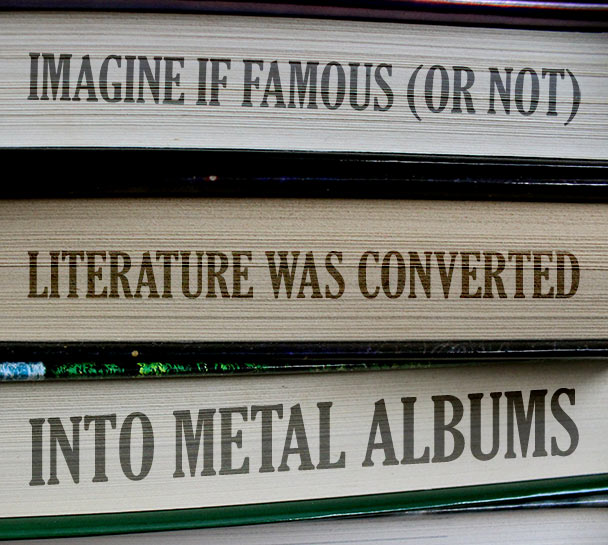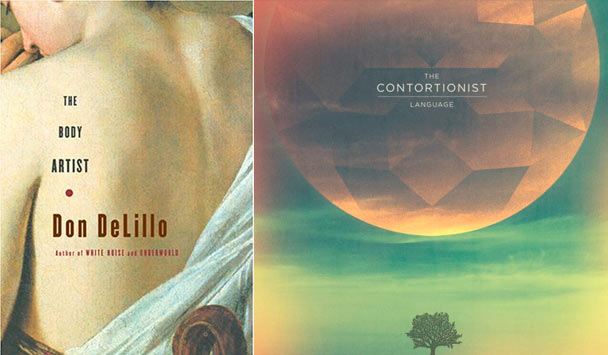
Written by Dylan Sanders.
The following pairings were made through similarities in musical and lyrical moods, themes, or other associations. I will include short summaries of the literary works included and also why I associated the chosen albums with them.
The Body Artist by Don Dellilo ~ Language by The Contortionist

A book you can read in an afternoon compared to an album you will have on repeat for days.
I’m going to start devoting as much writing to the books I review as I do the albums. Since I’m comparing the two as equals, I feel it is only fair. Originally, my plan was to compare Language to Margaret Atwood’s Oryx and Crake. I had found so many things that made the book feel as if it were meant to be told through The Contortionist’s 2014 masterpiece (my opinion) album. The evolution of new species, the thriving of The Earth despite apocalyptic annihilation of the human race, and the recreating of language and understanding minus outside influences of religion and war that drove humanity to overpopulation and eventually extinction. I chose not to write about that book, though, simply out of my dislike for it. If you want to pick it up on your own time, be my guest. The characters aren’t likeable (except the villain!) and the story itself is anticlimactic and weighed down with Atwood textually screaming “LOOK AT WHAT WE ARE DOING TO THE ENVIRONMENT, JESUS DO YOU WANT US ALL TO DIE?” It is important, but weighed down with preachiness.
So, instead I’ve decided that I’ll go with another book I’ve recently read that I think captures the essence of Language quite well. To begin, a quote from The Body Artist,
“You separate Sunday sections and there are endless identical lines of print with people living somewhere in the words and the strange contained reality of paper and ink seeps through the house for a week and when you look at a page and distinguish one line from another it begins to gather you into it and there are people being tortured halfway around the world, who speak another language, and you have conversations with them more or less uncontrollably until you become aware you are doing it and then you stop, seeing whatever is in front of you at the time, like half a glass of juice in your husband’s hand.”
The Body Artist is my first experience with Don Delillo’s work and it is by far the shortest book he has written. An un-massive 126 pages. This is a book you can read in an uninterrupted afternoon, but it is a book that deserves much more time. I’m reluctant to even advise reading a full chapter a day. The book is somewhat of a ghost story, taking place the majority of the time in the house of Lauren Hartke, an artist and widow. She begins hearing noises in her house after her husband dies and she goes to investigate only to find what appears to be a mentally challenged man living in one of the rooms. The man is ageless, he seems to live outside the boundaries of time itself. The descriptions of him vary between adult and child. He barely interacts with anything, only speaking in what seem to be broken recordings of conversations had between Lauren and her husband, exact impressions of their voices. He was a man who“… moved uneasily in space, indoors or out, as if the air had bends and warps. She watched him sidle into the house, walking with a slight shuffle. He feared levitation maybe. She could not stop watching him.”. Essentially, the book becomes about time, about us, and about how we exist in the spiraling gooiness of the fabric of space.
I feel the same gooiness in the first seconds of “The Source”. As the vocals wind up, the volume begins at a whisper and comes closer as if over hills and mountains, infinite lines of text parting to reveal a message until you are face to face with the words, straining your brain. Mike starts singing words that aren’t really words but sound like watery echoes of future songs on the album broken loose from space-time. The only true lyrics we are left with by the end of the song are “A wave of intuition, washed over me” which embodies both “The Source” and the rest of Language. Intuition is the human mind trying to make sense of babbling and sounds, attempting to make faces on the moon and trying to see Jesus on toast. So naturally we try to make sense of what we hear. We naturally find patterns in things that don’t really have patterns. As such, we view time as a linear portal when it could, in fact, be a circle.
Keeping with the theme of space-time relations, we need to keep in mind several things that continuously recur throughout Language. First, The Mother (or Mother Sun) is mentioned throughout the album and the speakers (or speaker) refer to her as a figure of worship and guidance. Second, the themes of intuition and the repeating of the words “ebb and flow” are constant. Third, the theme of existing as primordial sound, or sound present since the beginning of time is referred to over and over.
The Sun is basically a source of life, inspiration, guidance. We should assume, however, that the lyrics are referring more to a “knowledge star” than a physical one; a star that shines its light upon us and connects us to the rest of the universe. The repeated lines of “All that you know versus all that you don’t” apply here. Just how much space can we possibly occupy in the universe? The cosmos? Carl Sagan’s pale blue dot speech comes to mind.
Intuition I’ve already touched on a little bit, but ebb and flow are the same way. Life comes and goes, and the world changes with cosmic tides. There is nothing we can do but ride the waves.
As you may tell, movement of sorts is a core meditation of the album. If one wants to be critical, they may ask why the album wasn’t called Movement. It would make sense, right? I mean with all this space-time wobbliness and the gravity of The Mother Sun pulling all objects around its center in gravitational orbit you could express that thought.
The dictionary definition of Language is something close to “The method of human communication, spoken or written, consisting of the use of words in a structured and conventional way”. In that way, it doesn’t feel very much like an organic idea. But if we start to theorize, experiment we get a different view.
Language, to humans, consists definitively of speaking through mouth or text as I am doing now but in 1000 years, it will have evolved. And not only will languages and methods of speaking have evolved, changed, or evaporated, but the world around us will have changed as a result. In this way, language becomes something organic, living; a creature that lives between planes of existence and between definitions. Language can be expressed through art, love, and even silence if deemed necessary. This is constant proof that we are breaking boundaries that we, ourselves, have set up. Boundaries for what? To avoid confusion? To pretend we truly understand existence or purpose?
To quote Alan Watts in the same way as the closing track, “The Parable”
In other words, the so-called involuntary circulation of your blood is one continuous process with the stars shining. If you find out it’s YOU who circulates your blood, you will at the same moment find out that you are shining the sun. Because your physical organism is one continuous process with everything else that’s going on. Just as the waves are continuous with the ocean. Your body is continuous with the total energy system of the cosmos, and it’s all you.
In much the same way Lauren Hartke expresses her newfound knowledge of the truth of existence in a single space by contorting her body in avant-garde art performances, The Contortionist express their musings of existence through Language. They show us what it means to communicate a message through minimal textual example and they let us know that we don’t exist, but “we are existence”.
About the author:
Dylan has a BA in creative writing from Millikin University. He likes cooking, but he's only really good at various pastas and chicken tacos. He thinks you can do any task, even laundry, along with the ambience of death metal music. His first book, Skull Kids, will be released around May 2015 so ask him about it. Follow him on Twitter, Tumblr, Spotify, Last.fm, or Facebook if you want.












